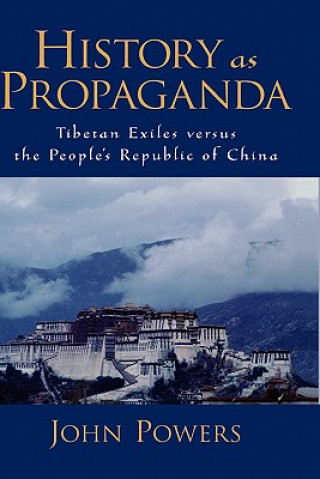
Kod: 04516366
History As Propaganda
Autor John Powers
Despite Chinese efforts to stop foreign countries from granting him visas, the Dalai Lama has become one of the most recognizable and best loved people on the planet, drawing enormous crowds wherever he goes. By contrast, China's ... więcej
- Język:
 Angielski
Angielski - Oprawa: Twarda
- Liczba stron: 224
Wydawca: Oxford University Press Inc, 2004
- Więcej informacji o książce

Zobacz książki o podobnej tematyce
Bon podarunkowy: Radość gwarantowana
- Podaruj bon o dowolnej wartości, a my się zajmiemy resztą.
- Bon podarunkowy dotyczy całej naszej oferty.
- Możesz wydrukować elektroniczny bon z e-maila a następnie przekazać go obdarowanemu.
- Ważność bonu wynosi 12 miesięcy od daty wystawienia.
Więcej informacji o History As Propaganda
Za ten zakup dostaniesz 200 punkty
 Opis
Opis
Despite Chinese efforts to stop foreign countries from granting him visas, the Dalai Lama has become one of the most recognizable and best loved people on the planet, drawing enormous crowds wherever he goes. By contrast, China's charismatically-challenged leaders attract crowds of protestors waving Tibetan flags and shouting "Free Tibet!" whenever they visit foreign countries. By now most Westerners probably think they understand the political situation in Tibet. But, John Powers argues, most Western scholars of Tibet evince a bias in favor of one side or the other in this continuing struggle. Some of the most emotionally charged rhetoric, says Powers, is found in studies of Tibetan history. History is viewed by both sides as crucial to their claims, and both invest a great deal of energy in producing works that purport to tell the "truth" about Tibet's past. Powers shows that the two sides' views are mutually incompatible and that both sides sincerely believe what they say. Both are operating within a particular psychological context in which certain assumptions guide their inquiry and predetermine their conclusions. Both are so thoroughly convinced of the utter rightness of their paradigms that they cannot even imagine that someone might sincerely hold the opposing view, and so they accuse their opponents of deliberately lying and covering up the "facts" and the "truth." Both reflect the vastly different cultural myths of the societies that produced them. Chinese sources begin with the notion that China is at the center of the world and is the only civilized society, with a mandate to rule over all other countries. Tibetan records are thoroughly infused with Buddhist imagery and presuppositions, and the underlying narrative is the diffusion and glorification of religion. Powers examines works on Tibetan history by Tibetan and Chinese authors that have been produced in English for Western consumption. He finds some of their claims absurd, others highly implausible, some humorous in an unintended way. Both narratives are fraught with internal contradictions and inconsistencies. And even the most ridiculous notions, Powers notes, are often reflected in works by contemporary Western academics. Powers's impartial examination of the competing narratives will help us to better understand the issues involved in debates about Tibetan history-why apparently arcane vestiges of the past are so important to both Tibetan and Chinese nationalist narratives.
 Szczegóły książki
Szczegóły książki
Kategoria Książki po angielsku Humanities History Regional & national history
342.32 zł
- Pełny tytuł: History As Propaganda
- Podtytuł: Tibetan Exiles versus the People's Republic of China
- Autor: John Powers
- Język:
 Angielski
Angielski - Oprawa: Twarda
- Liczba stron: 224
- EAN: 9780195174267
- ISBN: 0195174267
- ID: 04516366
- Wydawca: Oxford University Press Inc
- Waga: 474 g
- Wymiary: 243 × 166 × 19 mm
- Data wydania: 28. October 2004
Ulubione w innej kategorii
-

Hundred Years' War on Palestine
57.68 zł -15 % -

Ethnic Cleansing of Palestine
61.21 zł -15 % -

History of Japan
81.35 zł -4 % -

Ten Myths About Israel
55.37 zł -10 % -

Strange Death of Europe
70.17 zł -14 % -

Decline and Fall of the Roman Empire
25.06 zł -26 % -

Secret History
51.84 zł -23 % -

God's Playground A History of Poland
291.48 zł -

Mayflower
81.65 zł -5 % -

How to be a Victorian
51.84 zł -23 % -

Plantagenets
61.11 zł -23 % -

General's Son
85.57 zł -5 % -

Iran: A Very Short Introduction
57.68 zł -5 % -

Temples of Karnak
651.63 zł -

Cuneiform
47.31 zł -23 % -

Twenty Years A-Growing
42.68 zł -23 % -

China in Africa
155.45 zł -

Bohemian Paris
81.44 zł -5 % -

Islandman
42.68 zł -23 % -

History of Witchcraft in England from 1558 to 1718
78.93 zł -

Lancaster And York
89 zł -1 % -

Alexiad
89.70 zł -4 % -

Inside Hitler's Greece
99.67 zł -10 % -

Modern France: A Very Short Introduction
57.68 zł -5 % -

Diana: Her True Story - In Her Own Words
52.35 zł -15 % -

The Fourth Turning
77.22 zł -14 % -

The Oxford History of Ancient Egypt
65.74 zł -23 % -

Churchill: The Power of Words
70.17 zł -14 % -

Palestine
93.02 zł -15 % -

Korean History in Maps
133.50 zł -5 % -

Great Gatsby (Wisehouse Classics Edition)
32.71 zł -70 % -

Viking Way
196.33 zł -6 % -

The Thirteenth Tribe
59.39 zł -

My Promised Land
61.21 zł -15 % -

Vanished Kingdoms
87.89 zł -14 % -

Age Of Revolution
70.37 zł -23 % -

Life and Death of Anne Boleyn
100.17 zł -3 % -

Coming of the Third Reich
79.43 zł -23 % -

Children of Ash and Elm
78.93 zł -14 % -

Europe Between the Oceans
140.04 zł -10 % -

Socialism Betrayed
97.25 zł -5 % -

303 Squadron
79.43 zł -23 % -

Ancient Celts, Second Edition
133.50 zł -5 % -

Dancing in the Glory of Monsters
81.44 zł -5 % -

Battle of Britain: Luftwaffe Blitz (Images of War)
112.36 zł -6 % -

Age of Confucian Rule
139.34 zł -

Beyond Band of Brothers
70.37 zł -23 % -

Benjamin Franklin
70.37 zł -23 % -

On China
78.93 zł -14 %
zadowolonych klientów
Od roku 2008 obsłużyliśmy wielu miłośników książek, ale dla nas każdy był tym wyjątkowym.
Copyright! ©2008-24 libristo.pl Wszelkie prawa zastrzeżonePrywatnieCookies





 21 milionów książek
21 milionów książek Dostawa 10.99 zł
Dostawa 10.99 zł (32) 444 93 66 (8-15.30h)
(32) 444 93 66 (8-15.30h)